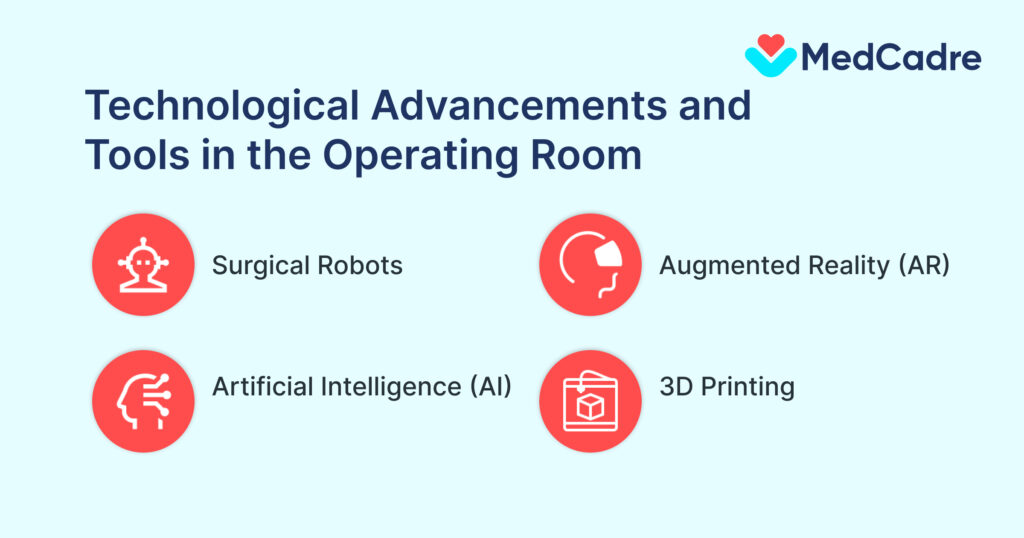Technology is transforming the field of surgical technology, significantly influencing the roles and responsibilities of surgical technologists in the USA. With advancements in tools and techniques, these professionals are navigating a changing environment. From enhanced training methods using virtual tools to the introduction of robotic surgical equipment, the era of surgical procedures is changing rapidly. This transformation means surgical technicians must adapt, learn new skills, and move forward with innovative technologies to remain effective in their roles.
In this context, we will understand how technology impacts their daily tasks and career opportunities becomes crucial for both current and aspiring surgical technologists.
Evolution of technology in surgical procedures
The evolution of technology in surgical procedures has revolutionized healthcare, transforming minimally invasive techniques and enhancing precision and outcomes. This journey began with the pioneering use of laparoscopy in the 1920s, employing small incisions and cameras to operate within the body, minimizing tissue trauma and recovery time.
The 1990s saw the rise of surgical robots, offering superhuman dexterity, tremor filtering, and 3D visualization, enabling complex procedures with unparalleled accuracy and control.
Nowadays artificial intelligence (AI) is further transforming surgery, from preoperative planning and image analysis to real-time guidance during procedures. These advancements continue to push the boundaries of surgical care, leading to less invasive, more precise, and ultimately, better outcomes for patients.
The impact of technology on surgical technician
1. Better training methods
Modern technology offers improved training tools for surgical technologists. Imagine using computer programs and virtual reality to practice surgical procedures before doing them on real patients. These tools provide hands-on experience without risks. Additionally, online courses and digital resources help these professionals learn and upgrade their skills anytime, anywhere.
2. New surgical equipment
New tools and machines are entering the operating rooms. Some surgeries now use robots to assist surgeons, making procedures more precise and less invasive. surgical technician need to know how to operate and manage these machines. As a result, those familiar with advanced equipment have an edge in the job market.
3. Specialized roles
With technological advancements, surgeries are becoming more specialized. For instance, some surgeries focus on specific body parts or use specific tools. This specialization means surgical technologists can specialize too. By gaining expertise in a particular area, like heart surgeries or bone procedures, they can find niche roles and command higher salaries.
4. Job growth and opportunities
As hospitals and clinics adopt new technologies, the need for skilled certified surgical technologists grows. The U.S. Bureau of Labor Statistics predicts a 7% increase in jobs for surgical technicians by 2030. This growth offers more job security. Moreover, those with specialized skills, especially in areas like robotic surgeries or specific medical fields, will see even more opportunities.
Technological advancements and tools in the operating room
The modern operating room is a marvel of technological innovation, brimming with tools that enhance precision, improve outcomes, and revolutionize surgical care. Here’s a glimpse into some of the most game-changing advancements:

2. Artificial intelligence (AI): AI is rapidly transforming surgery, from pre-operative planning and image analysis to real-time guidance during procedures. Imagine AI algorithms analyzing scans to identify tumors predict potential complications, or even assist surgeons with instrument selection and positioning. The future of surgery is deeply intertwined with AI’s potential.
3. Augmented reality (AR): Surgeons can now overlay 3D anatomical models onto the patient’s body in real-time, providing a visual roadmap for complex procedures. Think of it as having X-ray vision but with the ability to interact and navigate the patient’s anatomy directly. AR is enhancing surgical precision and decision-making.
4. 3D printing: From custom surgical implants to patient-specific models for pre-operative planning, 3D printing is making waves in the OR. Imagine printing a replica of a patient’s tumor to practice the surgery beforehand, or creating a biocompatible implant that perfectly fits a bone defect. The possibilities are endless.
These are just a few examples of the technological advancements transforming the operating room. As technology continues to evolve, we can expect even more breakthroughs, leading to a future of safer, more precise, and less invasive surgeries for patients around the world.
Integration of advanced surgical equipment
The advent of advanced surgical equipment, such as robotic-assisted surgical systems, has significantly influenced the role of surgical technicians in the operating room. Robotic-assisted surgical systems, exemplified by technologies like the da Vinci Surgical System, enable surgeons to perform precise and minimally invasive procedures with enhanced dexterity and control.
Surgical technologists play a crucial role in operating and managing these sophisticated robotic systems. Their responsibilities encompass setting up the equipment, calibrating instruments, and assisting surgeons during robot-assisted surgeries. Mastery of robotic technology necessitates specialized training and expertise, highlighting the evolving nature of the Clinical surgical technologist’s role in the age of technological innovation.
The demand for surgical technologists in the healthcare sector
The demand for certified surgical technologists in the healthcare sector is on the rise, driven by advancements in medical technology and an aging population requiring more surgical interventions.
As surgeries become more specialized and intricate, the role of surgical technologists becomes increasingly vital. Their expertise in preparing operating rooms, organizing surgical equipment, and assisting surgeons ensures efficient and safe procedures. Additionally, the shift towards minimally invasive surgeries and the integration of robotic-assisted procedures further emphasizes the need for skilled certified surgical technologist.
Also Read: How to Become a Certified Surgical Technologist
Consequently, healthcare facilities across the USA are actively seeking trained professionals to meet the growing demands of modern surgical practices, underscoring the importance and relevance of this profession in today’s healthcare industry.
Job opportunities for surgical technologists in the USA in future
The career of a certified surgical technologist in the USA shines bright! Over the next decade, this field is expected to experience faster-than-average growth, with the Bureau of Labor Statistics projecting a 5% increase in job openings. This translates to an exciting 8,600 new opportunities for skilled professionals every year.
Several factors contribute to this thriving environment. The aging population driving higher demand for surgical procedures, advancements in medical technology necessitating specialized skills, and the growing popularity of minimally invasive surgery all play a role.
Compensation is equally encouraging, with the median annual wage for surgical technologists reaching $74,250 in 2023. Top-paying states like California, New York, and Massachusetts offer even higher earning potential.
Beyond the general upward trend, specialization opens doors to even more promising prospects. Areas like cardiovascular, orthopedic, neurosurgery, and urology all offer unique career paths with dedicated expertise.
| Aspect | Statistic |
| Job Growth | 5% (2022-2023) |
| New Opening | 8,600 Annually |
| Median Annual Wage | $74, 250 (May 2023) |
| Top Paying States | California, New York, Massachusetts, Colorado, Washington |
| Job Opening (As Of Dec 2023) | Over 18,000 |
| Specialization Opportunities | Cardiovascular, Orthopedic, Neurosurgery, Urology |
Conclusion
As technology continues to shape the healthcare sector, the demand for skilled surgical technologists remains paramount. Their indispensable role in ensuring safe and efficient surgical procedures underscores the importance of continuous training and adaptation to evolving practices.
If you’re looking to advance or begin your career in this dynamic field, it’s essential to have the right support and guidance. That’s where MedCadre comes into play. Our dedicated recruitment team meticulously analyzes your profile to match you with suitable job opportunities tailored to your expertise and aspirations.
Don’t miss out on your next career opportunity. Drop us your CV today! Visit our website to learn more about the current jobs in the Surgical Technologist and healthcare sector and find out how MedCadre can help propel your career forward.
Share your updated CV with us!


